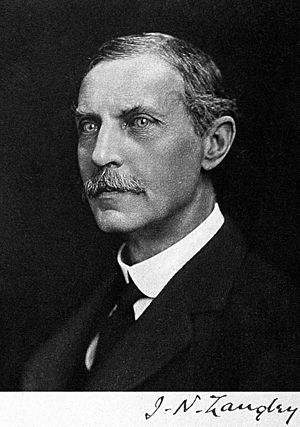John Newport Langley facts for kids
Quick facts for kids
John Newport Langley
|
|
|---|---|
 |
|
| Born | 2 November 1852 Newbury, England
|
| Died | 5 November 1925 (aged 73) Cambridge, England
|
| Nationality | British |
| Alma mater | University of Cambridge |
| Known for | Autonomic nervous system Secretion |
| Awards | Royal Medal (1892) |
| Scientific career | |
| Fields | Physiologist |
| Institutions | University of Cambridge |
| Academic advisors | Michael Foster |
| Notable students | Walter Morley Fletcher Charles Sherrington Leon Orbeli |
| Notes | |
John Newport Langley (2 November 1852 – 5 November 1925) was an important British scientist. He was a physiologist, which means he studied how living things work. Langley made big discoveries about the nervous system and how our bodies produce things like sweat or hormones (this is called secretion).
Contents
Who Was John Langley?
John Newport Langley was born in Newbury, Berkshire, England. His father was a schoolmaster. John went to Exeter Grammar School when he was young.
In 1871, he started studying at St John's College, Cambridge. He earned several degrees there. He spent his whole career at Cambridge University, which is a very famous school.
He started working at Cambridge in 1875. He became a professor of Physiology in 1903. This meant he was a top expert and teacher in how the body works.
Important Awards and Groups
Langley was chosen to be a Fellow of the Royal Society in 1883. This is a big honor for scientists in the UK. He even became the vice-president of this important group later on.
He also became an Honorary Fellow of the Royal Society of Edinburgh in 1916. This shows how respected he was in the science world.
Langley's Big Discoveries
John Langley is known as one of the first scientists to talk about "chemical receptors." Think of receptors like tiny locks on our body's cells. Only certain "keys" (chemicals) can fit into these locks to make the cell do something.
Nervous System Research
In 1901, Langley did important work on how our nerves communicate using chemicals. He studied extracts from adrenal glands. These extracts made body tissues react in ways similar to how nerves would. This helped scientists understand how chemicals carry messages in the body.
He also created the term "autonomic nervous system" (ANS) in 1898. This part of our nervous system works automatically, without us thinking about it. It controls things like our heartbeat, breathing, and digestion.
In 1921, he was the first to explain the parasympathetic nervous system. This is a part of the ANS that helps our body "rest and digest." It slows things down after stress.
Recognition
There is a special plaque in memory of John Langley at Trinity College Chapel in Cambridge University. This shows how much his work was valued.
Family Life
John Langley married Vera Kathleen Forsythe-Grant in 1902. They were married in Scotland.
 | Janet Taylor Pickett |
 | Synthia Saint James |
 | Howardena Pindell |
 | Faith Ringgold |

